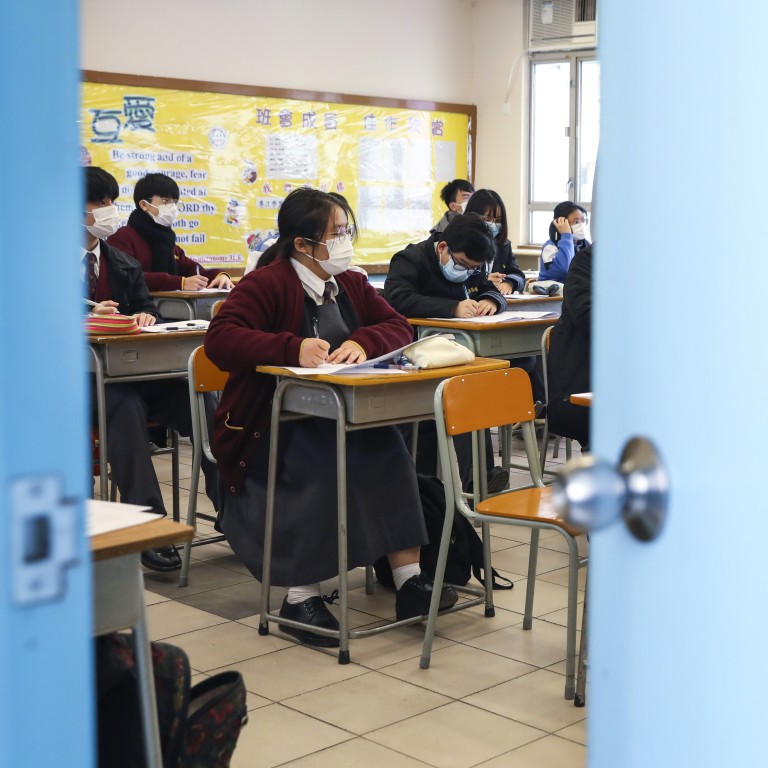
Stress among Hong Kong’s students and teachers has risen to worrying levels during the coronavirus pandemic, local groups say
- A study released by the counselling group Hok Yau Club found students rated their stress levels this year, on average, at 7.6 out of 10
- In a separate study, the group Youth IDEAS found teachers’ average stress level had risen to 6.97 out of 10, and that almost two-thirds wanted less administrative work
The two separate studies were released on Sunday by the student counselling group Hok Yau Club and the research centre Youth IDEAS, an arm of the Hong Kong Federation of Youth Groups.
The Hok Yau Club study measured pupils’ stress levels ahead of Hong Kong’s university entrance exams next week, and suggested the pandemic had taken a heavy toll on their mental health.
Happiness among Hong Kong children at five-year low, new survey finds
The respondents said the health crisis had affected their motivation and concentration, adding that they believed the switch to online learning had a negative impact on their studies.
“Teachers have less opportunities to interact with and care for students, and there may be less time for pupils to encourage and support each other,” Clement Ng Po-shing, a student guidance consultant with the Hok Yau Club, said. “In the past, interactions between teachers and students or the relationship between students were quite effective in reducing the pressure on DSE [candidates].”
Separately, Youth IDEAS surveyed 354 secondary school teachers between February 4 and March 12, and found most believed self-motivated learning was the ideal method of education (72.9 per cent), followed by experiential learning (68.1 per cent) and face-to-face teaching (64.7 per cent).

The group also found that many educators were upset at the amount of administrative work they had to deal with, which was not closely linked with students’ learning.
“Teachers should take charge of administrative work that is related to students, such as hiring a coach or venue for after-school activities,” Dicky Kwan Ho-kwan, a Youth IDEAS member, said. “However, something that is not really related to students, such as school promotion or maintenance … should be given to staff in school who are specialised in those areas.”
The Youth IDEAS poll found that almost two-thirds of the teachers wanted less administrative work, and about 58 per cent wanted to cut down on meetings to free up more time for things such as interaction with students, lesson preparation and continuing education.
It also found that teachers rated their level of work-related stress at 6.97 out of 10 during the coronavirus pandemic, up from a level of 6.4 before the health crisis.
Some 35 per cent of those surveyed worked more than 60 hours a week, while nearly 15 per cent worked 71 hours or more.
Bullying in Hong Kong schools up more than 50 per cent, education chiefs say
To make students and teachers’ life easier, Derren Lam Wai-yip, deputy convenor of Youth IDEAS’ education group, urged Hong Kong authorities to follow the examples of Taiwan and Singapore by giving students more opportunities to learn independently and find their own interests outside the classroom.
“Interest is the greatest master for students’ personal growth,” Lam said. “That’s why we want to give students time to discover their own interests and give teachers an opportunity to know what’s really important to our students, and then provide personal support or guidance. This is a small step and we’re looking forward to more improvement in the future.”
The group noted that Singapore would begin implementing “blended learning” through a mix of home-based and in-school activities at the secondary and pre-university levels later this year. Under the new model, schools will integrate home-based learning with in-school activities to empower students to take charge of their own education.
Hong Kong graduates will enter anaemic job market this year, statistics suggest
“During self-learning days, schools can make use of community resources, foster community cooperation and support students’ self-learning,” the report reads.
“Authorities can allocate more resources and time to educators to implement self-learning days, for example, by leveraging community organisations, planning and organising self-learning days, and giving students an opportunity to learn outside the classroom.”
Home-based learning will account for about 10 per cent of curriculum time at secondary schools per academic year, and up to 20 per cent at pre-university institutions, according to Singapore’s Ministry of Education.
In addition to setting up self-learning days, Youth IDEAS also recommended the government increase school funding to improve the student-to-teacher ratio, create a platform with easily accessible teaching resources, and establish a career development path for educators with separate tracks for teaching and administration.

